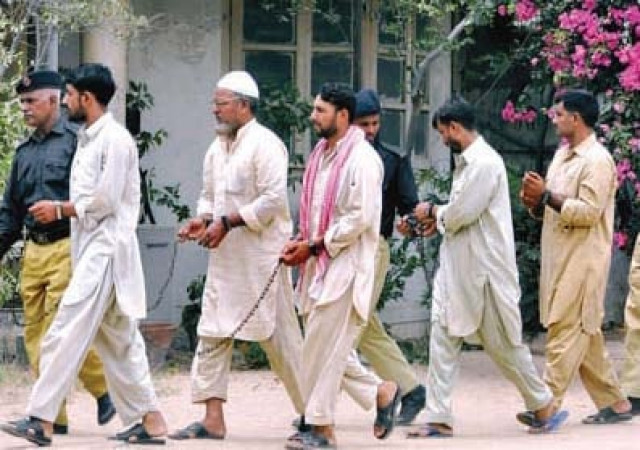The trials and tribulations of Karachi’s anti-terrorism courts
The conviction rate is impossible to calculate but there have been 99 in five years.

The trials and tribulations of Karachi’s anti-terrorism courts
The cops can’t keep up with the body count and the dockets are choked with cases. The daily cause list at the courts reads like a hellish inventory of human depravity: extortion, kidnapping, murder. But it is extremely difficult to peg these factors to the conviction rate.
Indeed, calculating a rate is virtually impossible. But some picture does emerge from the data. From 2007 to 2011, the three anti-terrorism courts acquitted 84 people and convicted 99 others. These totals are unreliable, however, as one court was empty for two years. One also has to factor in that a high court can overturn an anti-terrorism court verdict.
Sindh High Court’s Justice Maqbool Baqar looked at ways to improve the criminal justice system in terms of its response to terrorism. He states that the Supreme Court has had 25 acquittals under the Anti-Terrorism Act from 2008-2011, while 17 cases resulted in convictions. Among Justice Baqar’s recommendations, available on the Sindh Judicial Academy’s website, was that the “Anti-Terrorist Courts, or at least a majority of these courts, should concentrate on purely terrorist and sectarian offences cases.”
Easier said than done
The pillars of prosecution, evidence and testimony, barely have a leg to stand on. “The witnesses refuse to identify the person in court,” explains prominent lawyer Syed Tasawwur Hussain Rizvi, who secured six convictions in the high-profile murder of Shia scholar Allama Hassan Turabi. “They get threats and are scared. A lot of these cases are also held in jail. It is an issue for [witnesses] to come from home, wait for hours in jail and then testify.”
Rizvi, like other lawyers, was threatened by a suspect, said to be from the militant Lashkar-e-Jhangvi, who told him that even though he was in jail “the deed would still be done”. The history of the anti-terrorism courts is littered with cases of witnesses being bumped off. Just this week, a police officer who was going to testify was shot dead. Abdul Maroof Maher, who is the Special Public Prosecutor for Anti-Terrorism Court III, brings up the homicide of Geo TV reporter Wali Khan Babar in January 2011. Two policemen, a police officer’s brother and one informer linked to the investigations have been methodically targeted over four months.
Small wonder then that witnesses in high-profile sectarian cases turn hostile and baulk at identifying killers in court, even though they may have done it in front of the police earlier on. SPP Maher simply points out the lack of a witness protection programme. The law ministry is believed to be sitting on a draft for one that was sent by the Sindh home department.
For whatever it is worth, the Anti-Terrorism Act of 1997 says that protection must be provided to judges, public prosecutors, lawyers, witnesses and other people involved in court proceedings. But often ‘police protection’ only means that they will guard the vulnerable person as they make it to and from court.
“If they’ve tried to kill someone today, tomorrow it’ll be you,” remarked lawyer Rizvi. But he also added that witnesses should remember the teachings of Islam, stressing that if you witness something, you must provide testimony.
Case burden
It certainly does not help that the anti-terrorism courts are hopelessly overburdened. ATC I has 200 cases and ATC III has 136 when the law says that a court shall try one at a time. Investigating officers are just as worse off with up to 25 cases on their plate at a time. “If [an IO] appears in one case, he won’t be able to appear at another,” SPP Maher said, while explaining one of the reasons for delays.
Courts are supposed to hear cases within seven days of the charges being framed, but they can last up to a year. Lawyers are often the cause of the delays because they either keep asking the judges for more time or keep going on strike.
Published in The Express Tribune, September 7th, 2012.



















COMMENTS
Comments are moderated and generally will be posted if they are on-topic and not abusive.
For more information, please see our Comments FAQ